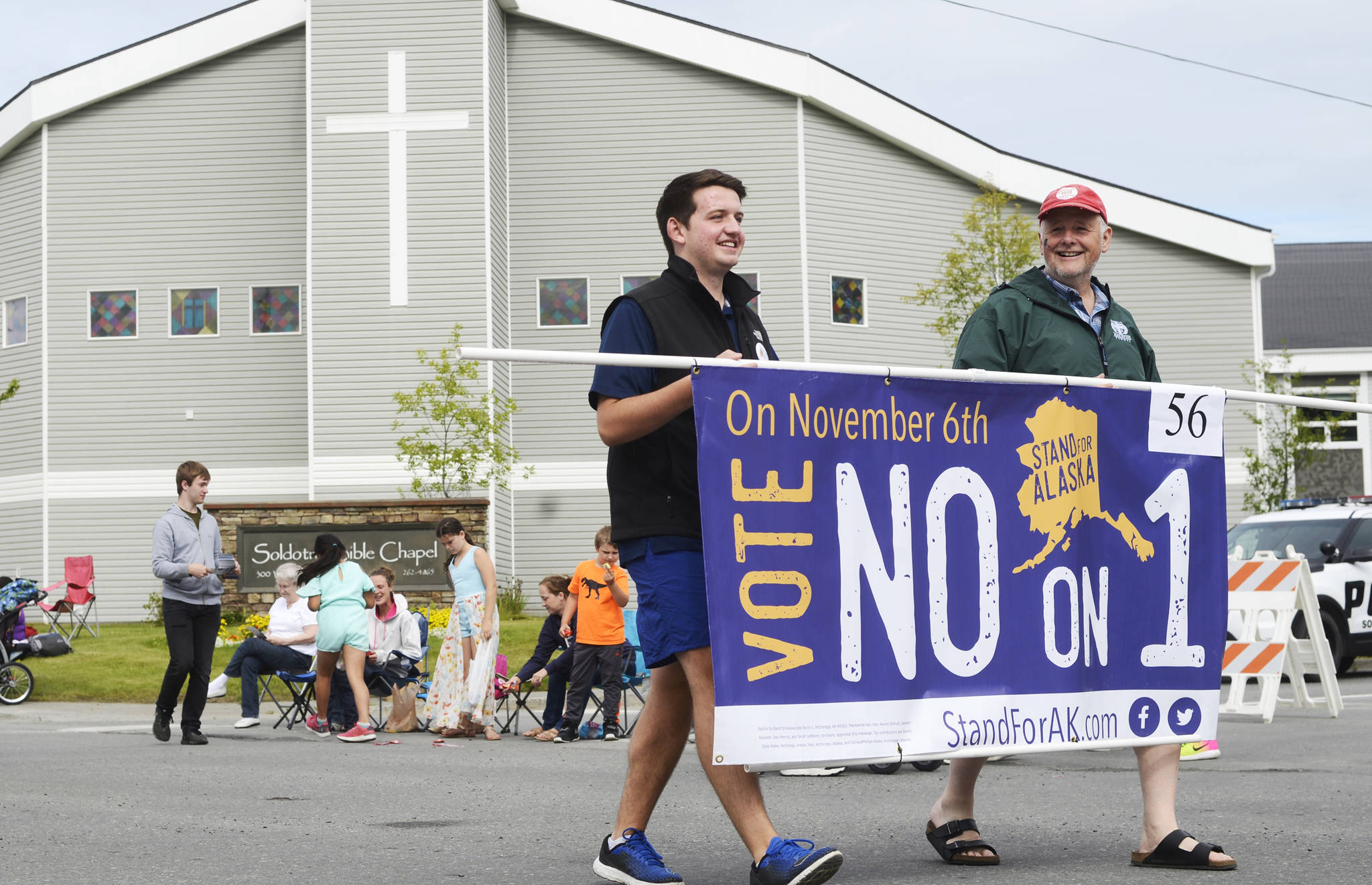Editors note: The story was corrected to show Mayor Nels Anderson saying he estimated moving the wastewater treatment plan would cost the city $40 million.
A resolution that would formally oppose Alaska Ballot Measure 1, failed at Wednesday’s Soldotna City Council meeting. The resolution, which was presented by council member Lisa Parker in an effort to protect potential impacts the initiative would have on the city, received a 3-2 vote, however, four votes are required to pass a resolution.
Parker said she brought the resolution forward because she was concerned about how the initiative would affect Soldotna’s wastewater treatment plant. She said the city has been trying to get answers about potential impacts from the state, the Department of Environmental Conservation, as well as reaching out to representatives for Stand for Salmon.
“This petition has the potential to make significant financial impacts on the residents of the city of Soldotna,” Parker said. “That’s why I brought this forward. We don’t want to be operating in the dark as we’re dealing with policy issues in Alaska. We need to look at it in terms of not only how it affects Alaska, but how does it affect our community here.”
Mayor Nels Anderson said he would estimate financial impacts of $40 million if the city were to move the wastewater treatment plant.
Parker said the city was unable to get clarifications as to what the impacts would be if Alaska Ballot Measure 1 were to pass.
The resolution was controversial, bringing in public testimony of all kinds forward. Many members supported Alaska Ballot Measure 1, saying Soldotna should support salmon habitat regulations.
Cathleen Rolph is an adjunct professor at the Kenai Peninsula College, and she was the first of many to speak in support of the initiative.
“Soldotna and the Kenai River are famous for salmon fishing,” Rolph said. “We are a salmon culture here. Salmon are very important to Alaskans, especially in Soldotna. We are the last place on earth that still has good salmon runs, even when runs are down.”
Rolph said the state of Alaska could not afford salmon habitat recovery if runs were destroyed.
“All over the world salmon habitat has been ruined,” Rolph said. “In the last nine years, the state of Washington has spent $5.5 billion in recovery efforts. We cannot afford that type of recovery here. With stricter permitting, Alaska won’t have to fit that bill.”
Clark Whitney Jr., a teacher in the Kenai Peninsula Borough School District also expressed support for Alaska Ballot Measure 1.
“Strength and the protection of salmon habitat should be welcomed by Soldotna since the economic health and the very identity of our town is largely dependent on healthy salmon runs,” Whitney said. “I agree with the city of Soldotna that it would be wonderful if a legislative process could create protections, but it’s obvious our legislature has no appetite for such a process.”
While others, Linda Hutchings, commended the city for trying to take a stand against the initiative. Hutchings grew up on a homestead in Soldotna and spent summers commercial fishing on Kalifornsky Beach. She said present salmon protections are on the right path.
“We have regulation, upon regulation that has to be addressed before a bridge, a park, a road, a school or a hospital can be built,” Hutchings said. “We do not need to start over. We can continue in the direction we’re going.”
She noted recent studies that show low returns of salmon as an issue with an issue, not with the Kenai River watershed.
“It’s not a freshwater issue, we have to consider changes in our oceans,” Hutchings said. “We have great runs and poor runs through the years. The last few years have been poor in Cook Inlet, but stellar in Bristol Bay. It is not the industry at fault. Nature has a mind of its own. These thoughts in mind I thank the council for bringing this resolution and I urge you to support it.”
Others testified to say they felt it was inappropriate for the council to take a stand on the issue.
“I’d like you to consider not having an opinion on this because I also agree that it isn’t the place of the city council to tell their citizens what they should think or fear monger,” Willow King said at the meeting. “That’s an old technique that needs to be gone.”
Jack Hester simply asked the council why Alaska Ballot Measure 1 would keep the city from getting a permit.
“Why are we fearful we wouldn’t be able to do that?” Hester said. “I mean if we’re doing the right thing, we should be able to do that?”
The council did not offer a response.
Before the council went to a vote, Council members Paul Whitney and Justin Ruffridge, both up for reelection next week, expressed their opposition to the resolution.
“It’s an issue that goes to the voters and we shouldn’t be influencing that in any way shape or form,” Whitney said.
Before calling for a vote, Mayor Nels Anderson gave his opinion on the matter. Anderson does not have a vote in the council, except in the case of a tie or in a veto.
“I will not veto what the council votes on tonight,” Anderson said. “I just want you to know my opinion that Ballot Measure 1 is a good thing and doesn’t go far enough.”
Alaska residents will be voting on Alaska Ballot Measure 1 in the mid-term elections on Nov. 6.

